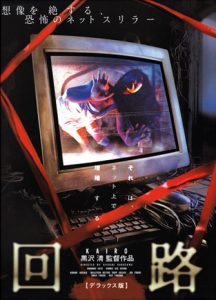AKA: The Circuit
Director: Kiyoshi Kurosawa
Cast: Haruhiko Kato, Kumiko Aso, Koyuki, Kurume Arisaka, Masatoshi Matsuo, Show Aikawa, Jun Fubuki, Shinji Takeda, Koji Yakusho, Shun Sugata
Running Time: 119 min.
By Numskull
What Kairo sets out to do, it does superbly. However, not everyone will be happy with what it does, which is to sustain an eerie mood for two hours rather than simply tell a scary story. That’s not to say there isn’t a plot; it’s just to say that the plot isn’t the strongest aspect of the film. That being the case, I trust the reader will forgive me for not describing it in much detail. In a nutshell, people are seeing disturbing apparitions on their computer screens, and there is some transition by these supernatural elements into the material world. The witnesses are left feeling unbearably depressed, and a rash of suicides occurs. Throw some more freaky shit into the pot, like black smears left on spaces once occupied by bodies, and “forbidden rooms” sealed with red tape (the adhesive kind, not the bureaucratic bullsh*t) and you’ve got a horror movie stew that some will declare delectable and others will spit out in disgust.
The film follows two groups of characters whose stories eventually merge, but it is understood that the things they’re experiencing are happening everywhere. There are distinct shortages of expositional dialogue, quick cuts, and bright colors. It’s largely just people reacting to bizarre circumstances…sometimes sensibly, sometimes not…without a lot of dramatic exclamation points or jarring music when the movie wants to say “This is important.”
Like I said before, Kairo is more concerned with mood than narrative. It will disturb you for as long as you watch it but not much longer, and it won’t exactly “scare” you. Perhaps this is partly because of its use of computers as tools for the evil, nasty supernatural powers that be. It’s hard to think of a humming piece of machinery, with pretty green lights, made of plastic and glass and metal, as being a collaborator with, or outlet for, the type of unexplained phenomena that has always scared us human beings, with our pockets of rationality in the pants of the big, mysterious universe…but that’s what’s going on here. The use of modern technology in conjunction with primal horror worked for the Ring films, but Kairo’s structure is of a much different breed. Suffice to say that Kairo succeeds admirably and is recommended to all who enjoy films of this type.
Numskull’s Rating: 8/10
By Len
Like Ring, the horror in Kairo is based on something that couldn’t be less scarier. Honestly, on a scale of 1-10, how scary do you consider webcams to be? That’s what I thought too. However, like Ring, it succeeds admirably and the end result not only terrifies, but gives something to think about too. This shouldn’t come as a surprise to anyone familiar with Kiyoshi Kurosawa’s (not related to Akira) earlier work, but people less familiar with the new japanese horror cinema will definately find this to be an unique approach to a genre that is usually associated with shitty scripts and less intellectual content than your average episode of Survivors.
Kairo tells two overlapping stories. In one, a girl working in a garden witnesses a strange suicide which affects everyone around her in radical ways. The other tells about a young guy who’s attempts at using the internet change his life. Basically, it’s one story, but with two different viewpoints. While this approach is a bit confusing at first, once the story gets properly started it’s easy to follow the stories. It’s also easy to see why Kurosawa felt the need to tell two stories. This way the two stories concentrate on different things, while allowing the viewer to get the full picture of what’s happening. The girl’s story is more about the way the suicide and the following events affect her life, and other story concentrates more on what’s causing the suicides, and thus unravelling some of the mystery.
I liked Ring. It was a well crafted horror film with some genuinely scary parts and I loved the way the timelimit imposed on the characters was used to create tension. However, Kairo manages to go further than most japanese horror films, both in storytelling and tension. It might not be quite as scary as Ring or maybe Dark Water (yeah, that was a sh*tty film, but it had it’s share of scary bits) for example and some might find it quite slow, but the script is stronger and has much more emotional content (not to mention the metaphysical ideas which Kurosawa examines yet again, although in a much more lighter tone compared to Cure or Charisma). In addition to the terrifying scenes, there are also many scenes full of real human emotion, which is seen way too rarely in films nowadays.
Len’s Rating: 9/10




Pingback: Kairo aka Pulse (Japan, 2001) Asian Horror Movies | Horror Asia